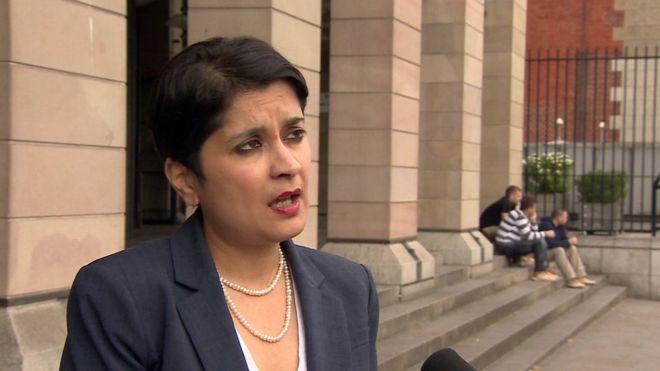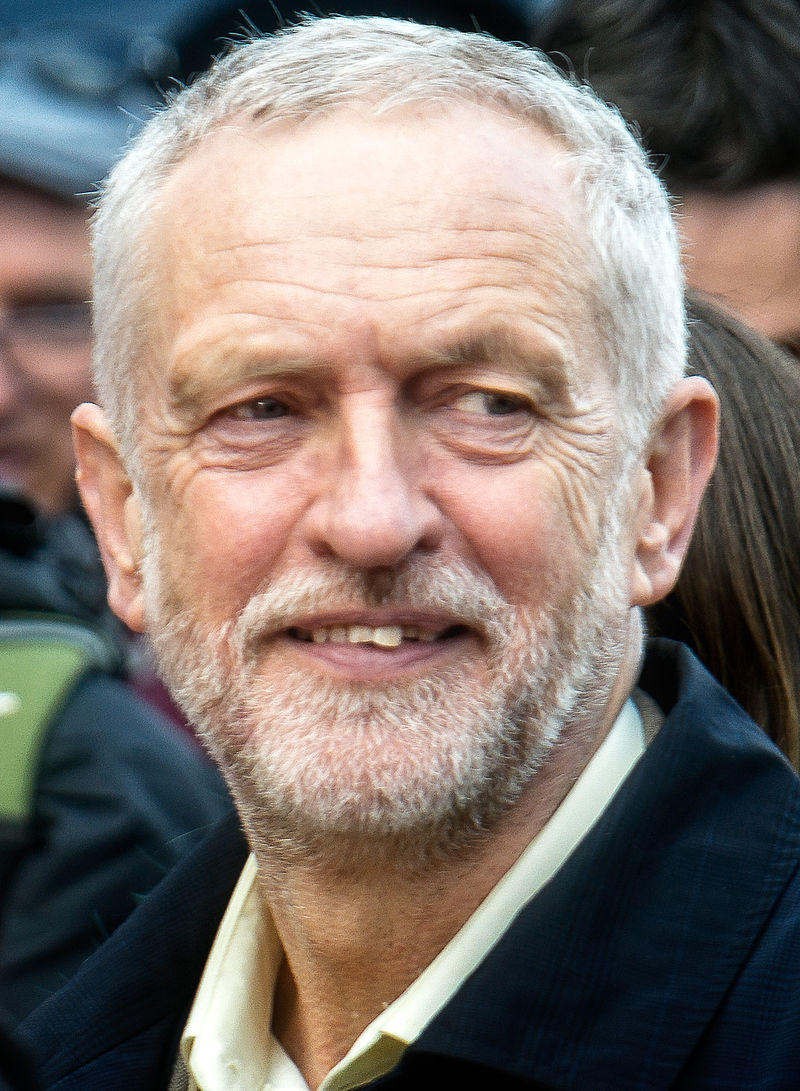Report rejects anti-Semitism smear
By Brian Durrans
Labour and Palestine solidarity have lessons to learn from the report of the Chakrabarti Inquiry, which rejects claims that the Party 'has a problem with anti-Semitism'.
In the last issue of this journal (no. 25, summer 2016), Questor exposed the well-orchestrated campaign to undermine both the Labour left and the pro-Palestine Boycott, Divestment and Sanctions (BDS) movement as 'anti-Semitic'. As we pointed out, Labour's relative success in the May elections was a setback for that campaign.
Since then, the Chakrabarti Inquiry on anti-Semitism in the Labour Party - with expanded terms of reference to include Islamophobia and other forms of racism as well - issued its report on 30 June. Its promptness was favourably noted by those grown old waiting for the Chilcott Report which appeared a few days after, and, like Chilcott, though for different reasons, it represents a further setback for the right. [1]
Wrong-Footed
The Chakrabarti Report has seriously wrong-footed Israel's supporters, with some guardedly welcoming it and others openly critical; [2] but if the 'anti-Semitism' smear campaign is unlikely to be abandoned, [3] its main objectives of delegitimising criticism of Israel, consolidating Zionist influence in the Labour Party and, above all, demonising Jeremy Corbyn, have suffered a conspicuous defeat.
The Inquiry may have given Corbyn only a short respite from the type of smear on which it focused, but the clarity of the report itself, and of the thinking which went into many of the submissions it considered, has helped educate members on basic principles and how to resist intimidation and needless division which should stand both the Party and Palestine solidarity in good stead for years to come. And indications from opinion polls in connection with the Labour leadership contest indicate that Corbyn's popularity is stronger than ever.
In particular, the inquiry
- found no evidence of widespread or systematic anti-Semitism in the Labour Party;
- rejected the idea of any 'hierarchy of racism', meaning that Islamophobia, anti-Semitism and what it called Afriphobia are "all equally vile forms of racism" - that is, anti-Semitism is not a special case;
- Zionism as a political position does not equate to Judaism;
- activists cannot be expected to highlight issues relating to one country or government only on the condition that they spend equal time on infractions or injustices elsewhere - hence you can campaign for Palestinian rights without being accused of unfairly 'singling out Israel' for anti-Semitic reasons; and
- sharing a platform with someone whose views you don't necessarily share does not make you 'guilty by association'.
Each of these points, which the Inquiry has now decisively nailed, had been repeated by Israel's friends and reported in the media against Corbyn and the Labour leadership, and against everyone sympathetic to, or campaigning for, Palestinian rights. Regarding the Report's formal recommendations,
- there is a welcome if implicit rejection of the discredited EUMC (European Monitoring Centre on Racism and Xenophobia) working definition of anti-Semitism. This definition, which the EU itself has rejected, [4] explicitly targets legitimate criticism of Israel and would limit freedom of expression by formulating Zionism as merely an aspiration to Jewish self-determination rather than the credo of a state founded on the dispossession of Palestinians; [5]
- eight of the recommendations should ensure that in future any allegations of racism against party members will be investigated according to principles of natural justice, rather than by media or with a presumption of guilt; and
- education and training needs across the Party relating to such matters will be handled in partnership with "Trade Unions and Higher Education providers" - a welcome rejection of the bid for this role by the strongly pro-Israel 'Jewish Labour Movement' [6] and / or the Jewish Board of Deputies. [7]
The forward march of BDS continued
The BDS movement - the other target of 'anti-Semitism' allegations - also dented the smear campaign when an attempt by some supporters of Israel, styling themselves 'Jewish Human Rights Watch', to prevent local authorities from applying ethical criteria when letting contracts was recently rejected by the High Court. [8] The same pro-Israel group also 'hinted', back in February, that it might take legal action against Cambridge University allowing pro-Palestinian students during Israeli Apartheid Week to erect a mock checkpoint to dramatise their argument. The group describes the structure - with no sense of irony in view of how Palestinians have to endure such things in the reality of the Occupied Territories - as a "deliberately intimidating paramilitary-style antisemitic 'checkpoint'"; [9] but if the clear and unapologetic defence the university's decision from its Vice-Chancellor was not reason enough, the group's experience in the High Court may well have dissuaded them from trying to take their bizarre complaint any further.
Have the smearers overplayed their hand?
Labour's right-wing, having failed to force Corbyn's resignation in penance for what it sees as the EU referendum 'defeat', is trying to damage him, and the Party itself, by means of a second leadership election which it seems unlikely to win. 'Anti-Semitism' innuendo may well continue to serve its intended purpose, but as further exposés and counter-arguments on this issue gain traction - and if Labour can see off this latest onslaught from the right - the smear campaign may prove not only less effective than its manipulators hoped but also more counter-productive than they could have imagined.
If at the moment the Labour leadership odds favour Corbyn over former corporate lobbyist and pro-austerity-voting Owen Smith, it is less clear what the right-wing will do if the membership defeats them for the second time in two years. Having demonised Corbyn as a friend of 'terrorists', the pro-Israel lobby has little room to negotiate favours, and faces the possibility of a major setback if Labour can rejuvenate itself around a left or non-Blairite centre-left anti-war and anti-austerity agenda, and which, in the best traditions of the Labour movement, also sides with Palestinians rather than with their oppressors. In Britain, as in the US, Israel's friends have adopted a bipartisan strategy, developed and maintained over many decades, to ensure that neither Labour nor Conservatives, nor Democrats nor Republicans, will act against Israeli interests during their oscillating administrations, whatever (usually slight) rhetorical differences there might be between them. Under Obama, this strategy has shown the first signs of unravelling; but in Britain it may be under more serious threat, broadly vindicating predictions made by the right-wing Israeli think tank, the Reut Institute, in 2010. [10]
One lovely black eye
In the meantime, the UK's new Conservative Prime Minister, Theresa May, brings to her new job some weasel words of social inclusiveness but also a track record as Home Secretary that tells a very different story. In 2012, she was at the centre of a controversial attempt to curtail free speech which ended in a humiliating black eye in the High Court. Writing in the Guardian online, 9 April 2012, journalist David Hearst argued that ‘the heart of the matter’ in the Home Secretary’s illegitimate attempt to exclude Palestinian community leader Sheikh Salah from the UK was her exclusive reliance on untrustworthy advice from the (staunchly pro-Israel) Community Security Trust (CST). [11] That advice, in the view of two expert witnesses, ‘failed to distinguish between anti-Semitism which Salah denied and criticism of the acts of the Israeli state - for which he was justifiably unrepentant - and therefore gave an unbalanced perspective.’ This is indeed a crucial point. The CST's arguments which the then Home Secretary accepted amounted to a propaganda defence of Israeli apartheid. [12]
Jeremy would, Theresa may?
Although he did nothing to fit actions to his words, Theresa May's predecessor as Prime Minister, David Cameron, did at least say, on a visit to Gaza in 2010, that the blockade had turned it into an open-air prison-camp. [13] Whether his former Home Secretary will do any better will partly depend on how much pressure she is under and from which side it comes. But on the issue of Israel-Palestine, if the Conservatives are confronted by a Corbyn-led Labour Party, clear and confident of its principles and able to argue them while swatting aside any further smears of anti-Semitism with a rolled-up copy of the Chakrabarti Report, then she will either need to compromise or have a real fight on her hands. [14]
Notes
[1] The full report, including its membership, their credentials, its terms of reference and recommendations, was published immediately online: http://www.labour.org.uk/page/-/party-documents/ChakrabartiInquiry.pdf.
[2] Compare, for example, http://www.jlm.org.uk/jewish_labour_movement_reaction_to_chakrabarti_inquiry_report; and https://engageonline.wordpress.com/2016/06/30/preliminary-response-to-the-chakrabarti-inquiry-into-antisemitism-in-the-labour-party-david-hirsh/. The anti-Zionist Free Speech on Israel network is also critical of some aspects of the report: http://freespeechonisrael.org.uk/chakrabarti-missed-opportunity-develop-anti-racist-policy-labour/, while the Palestine Solidarity Campaign sees its value in assisting the solidarity movement: http://www.palestinecampaign.org/chakrabarti-report-welcomed-palestine-solidarity-campaign/.
[3] At the press launch of the report, a Labour activist criticised MP Ruth Smeeth, who was present, for colluding with a Daily Telegraph journalist against Jeremy Corbyn then under open attack from most of the parliamentary party. The activist's comments, though strongly expressed, had nothing to do with the Chakrabarti Report, yet were misrepresented by some of the media as an expression of anti-Semitism. A careful review of the video coverage shows no evidence to justify this, and the same applies to allegations reported as fact that Corbyn on this occasion compared Israel to IS: https://electronicintifada.net/blogs/asa-winstanley/media-concoct-firestorm-jeremy-corbyn-launches-anti-semitism-report. Well after the report that found Labour does not have 'a problem with anti-Semitism', and before she herself withdrew from the leadership contest, Angela Eagle demonstrated her unfitness for office with a malicious meme of her own by claiming that if it failed to elect her, Labour would remain, among other negative things, an anti-Semitic 'nasty party'.
[4] https://benwhite.org.uk/tag/anti-semitism/.
[5] http://www.palestinecampaign.org/wp/wp-content/uploads/Evidence-from-PSC-to-Chakrabarti-inquiry-final-June-2016.pdf, page 4.
[6] http://freespeechonisrael.org.uk/who-are-jewish-labour-movement/.
[7] Jonathan Arkush, President of the Board of Deputies, is openly hostile to Corbyn: https://www.politicshome.com/news/uk/political-parties/labour-party/news/76155/labour-anti-semitism-problems-stem-jeremy-corbyns.
[8] Announced in late June, the ruling was hailed as a victory for local democracy as well as for the BDS movement. The defeated action had been brought against Leicester, Swansea and Gwynedd city councils, all of which had passed resolutions to boycott Israeli settlement goods. The plaintiff was ordered to pay costs. http://english.pnn.ps/2016/06/28/victory-for-bds-as-high-court-rules-councils-can-boycott-israel/.
[12] http://www.theguardian.com/politics/2010/jul/27/david-cameron-gaza-prison-camp.
[13] For a succinct, documented and up-to-date summary of the grounds for characterising Israel as an apartheid state, see Ben White's recent article at http://www.palestinecampaign.org/article-israel-apartheid-state/.
[14] It is too soon to say whether her welcome declaration that Palestinians must be granted full human rights is more than just rhetoric. Could she have learned from her mauling by the High Court four years ago? https://electronicintifada.net/blogs/ali-abunimah/theresa-may-palestinians-must-have-full-civil-rights.


"Having demonised Corbyn as a friend of "terrorists", the Israel lobby has little room to negotiate favours, and faces the possibility of a major setback if Labour can rejuvenate itself round a left or non-Blairite centre-left ant-war and anti-austerity agenda, and which, in the best traditions of the Labour movement, also sides with Palestinians rather than with their oppressors."








